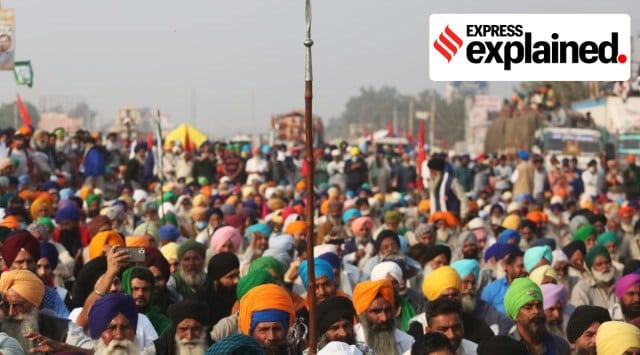- India
- International
Talks with Centre: Wheat sowing over, farmers have free time to continue agitation
The "free time" is something the government may not have fully anticipated. The timing of the capital siege and ability to stay put for at least the next few weeks could well work to the protesters’ advantage.
 Farmers at Singhu border on Tuesday, December 1, 2020. (Express Photo: Gajendra Yadav)
Farmers at Singhu border on Tuesday, December 1, 2020. (Express Photo: Gajendra Yadav)Parties in most negotiations tend to start by taking maximalist positions. It isn’t any different in the current standoff between the Centre and farmer unions over the three agricultural reform legislations.
The farmer body representatives, mostly from Punjab and Haryana, are demanding a complete repeal of the three ‘kala kanoon (black laws)’. If that is not all, they are also seeking that the minimum support price (MSP) for crops be made an entitlement, having the force of law rather than mere government policy announcement.
The Narendra Modi government, on the other hand, has ruled out any rollback of the three laws, or even putting on hold their implementation. For it, these Acts – which relate to dismantling the monopoly of APMCs (agricultural produce market committee) mandis in sale and purchase of crops, enabling contract farming and doing away with stockholding restrictions in foodstuffs – are a statement of its commitment to economic reforms.
On Monday, the Prime Minister himself, at a public rally in Varanasi, denounced the opponents of the new Central farm laws as spreading misinformation and sowing fear among farmers. At Tuesday’s talks that three Union ministers held with 35 farm union leaders, the Centre merely offered the constitution of a committee to discuss the contentious provisions of the three laws. The leaders were asked to nominate members to the proposed panel, which would also have agriculture experts and officials. The unions predictably declined the offer.
From a bargaining standpoint, the farmers are probably better placed at the current moment. In Punjab and Haryana, not only has harvesting of the kharif paddy been completed, even sowing of wheat for the new rabi season is virtually over. Most farmers have also done their first round of urea application and irrigation, which takes place 2-3 weeks after sowing.

It means they have some free time for agitation, which wasn’t the case till 15-20 days ago. Punjab and Haryana farmers generally plant their wheat before mid-November. This relative leeway in wheat may not be available for sugarcane growers in neighbouring western Uttar Pradesh. Sugar mills have really started crushing operations for the new 2020-21 season only after Diwali. UP farmers are, therefore, busy now in harvesting cane, which is their main cash crop.
This “free time” for now, especially with Punjab and Haryana farmers, is something that the Modi government may not have fully anticipated. The timing of their laying siege to the national capital – well after marketing of paddy and sowing of wheat – and ability to stay put for at least the next few weeks could well work to the protestors’ advantage. 📣 Express Explained is now on Telegram
Incidentally, government agencies have procured a record 202.77 lakh tonnes (lt) of paddy from Punjab this time, as against 162.33 lt in 2019-20 and the previous all-time-high of 176.61 lt in 2017-18. The Modi government may have undertaken this unprecedented purchase from the state – the MSP value of which works out to Rs 38,283 crore – to dispel farmer apprehension about the new laws leading an undermining of the existing open-ended procurement and APMC mandi system. The same Punjab farmer who sold his paddy at the MSP barely two months back is now sitting in a tractor trolley at the Delhi-Haryana border, seeking repeal of the kala kanoon.
The worst case scenario for the Centre would be if the farmers continue blockading the entry points to Delhi long enough to force it to concede to their maximalist demands. That would include not just revoking/putting on hold its three farm laws, but also making MSP a legal right. In other words, far from moving forward, this would amount to a reversal beyond even the pre-reform situation.
Don’t miss from Explained | Why did Punjab farmers march to Delhi despite the state passed its own farm Bills?
The Modi government has, all through, maintained that its legislation on allowing trade in farm produce outside APMC mandis has “nothing to do with MSP”. MSP, as Union Agriculture Minister Narendra Singh Tomar has rightly argued, never had statutory backing. While MSP is declared for 23 crops, there are limits to its enforcement whether through government procurement or forcing others (private traders, processors, organised retailers and exporters) to pay.
As things stand, farmers have seemingly won the first round. The government may have to relent on its maximalist position. It cannot, in any case, afford a scenario where conferring on farmers “the right to sell at MSP” becomes the primary demand.
EXPRESS OPINION
Apr 24: Latest News
- 01
- 02
- 03
- 04
- 05









































